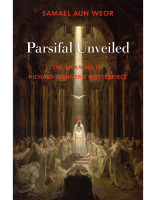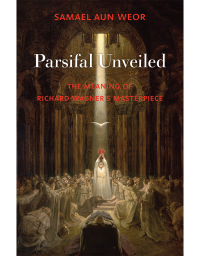After having created To Soma Heliakon in the “forge of the Cyclops” (sex), I then had to pass through a time of profound reflections.
Opportunely, it is good to clarify that the superior emotion, the mind of the Gnostic ascetic, and the conscious will are found contained inside the golden body of the solar human, as within a holy cup.
It is not irrelevant to emphasize that after one has become dressed with the Wedding Garment of the Soul in the Dantesque Ninth Circle, the Second Birth becomes a transcendental fact.
Within the residence of love, I found other brothers and sisters who had also intensely worked in the “flaming forge of Vulcan” (sex). All of them were gloriously shining amidst the indescribable enchantments of Good Friday. By all means it stands out that I am mystically talking about the temple of the “Twice-born.” This is a divine humanity, extraordinary people from various nations, populaces, and tongues!
Inside that “aula lucis” I came to comprehend in an integral way the transcendental idea that the human being must also be carnally one with God. It is unquestionable that only by delivering his body to God can the human creature intimately Self-realize.
Even though it seems paradoxical, it is clear that not all the “Twice-born” have dissolved their “I.”
After the Second Birth, I was intensely instructed in the temple. I comprehended at that time that if I did not want to convert myself into a hasnamuss with a double center of gravity, I needed to die from moment to moment.
Previously, in my former books, I explained that the hasnamussen are cosmic failures, abortions of the Divine Mother Kundalini. They are lost cases.
It is indispensable and urgent to radically die within our own person, in the flesh, in the “I,” with the firm purpose of incarnating the potency of God within ourselves.
We need to reconcile ourselves with the Supreme Maker so that He can recognize in the flesh His own creature.
Light and dust must celebrate their nuptials; thus, together heaven and earth become liberated with love.
A new heaven is already prepared. Hence, in like manner, a new earth must be created, equal to Him in beauty and magnificence.
The exterior is just the projection of the interior. Therefore, whosoever is already very well dead and has God inside projects out of himself a paradise.
Deep reflections touched my soul… I comprehended in depth and in integral way each one of my own psychological errors.
Oh, Maha Lakshmi, Maha Saraswati, Isis, Adonia, Insoberta, Tonantzin, Divine Mother Kundalini! Om… Shanti… Shanti…
Without you, my Divine Mother, I could never have eliminated the red demons of Seth, those entities of darkness that personify our defects!
One given day (the date, day and hour does not matter now), I was visited by Kether of the Hebrew Kabbalah, “the Ancient of Days, my Father who is in secret, the Hidden of the Hidden, the Pity of Pities, the Mercy of Mercies.” The Lord sat on his throne and said, “The way you are working is good, you are doing very well, you must continue with your work…”
Time passed by, and I was dying from moment to moment… To comprehend and to eliminate, that was my task.
It is written with fiery coals in the great book of splendors that those who have died in themselves are welcomed in the world of the dead… My case was not an exception to the funerary rule. Thus, dressed with that funerary attire that I am always accustomed to using after every reincarnation, I then joyfully lived within the occult abode.
I want to finish this present chapter by transcribing and even briefly commenting on each one of the verses of the Egyptian confession.
Papyrus Nebseni
1. Hail, thou, Spirit whose strides are long, who comest forth from Anu (Heliopolis), I have not committed iniquity.
It is obvious that the one who indeed was capable of evil-disposed deeds ceased to exist. Only the ego commits such actions. Yet, the Being of the defunct one who still has his physical body alive will never perform anything evil.
2. Hail, thou, Spirit who art embraced by burning fire, who comest forth from Kher-aha, I have not behaved with violence.
By all means it stands out with dazzling clarity that violence is multifaceted. The ego breaks laws, wounds honor, profanes, violates the mind of others, smashes, crumples, ruins, intimidates the neighbor, etc. Yet, the Being respects the free will of our neighbors. He is always serene and appeased.
3. Hail, thou, Spirit who inhales divine breath, who comest forth from Khemenu (Hermopolis), my heart detests brutality.
Indeed, the ego is brute, torpid, incapable, a friend of lewdness, bestial by nature and by animal instinct. Yet, the Being is distinct, refined, wise, capable, divine, sweet, severe, etc.
4. Hail, thou, Spirit who eatest over the shades of the dead, who comest forth from Qerrt, the place where the Nile riseth, I have not stolen.
The ego pleases itself with thievery, robbery, pillaging, ravishment, abduction, fraud, swindle, deprivation, with borrowing and not resturning, with abusing the trust of others and thus keeping what is not his own, with exploiting the neighbor, with dedicating himself to peculation, etc. Yet, the Being enjoys when giving and even when renouncing the fruits of his actions. He is serviceable, unselfish, charitable, philanthropic, altruistic, etc.
5. Hail, thou, Spirit who comest forth from Re-stau, whose limbs come rotten and emit a stench! I have not slain man or woman.
Without any doubt, assassination is the worst act of corruption in the world. A neighbor’s life is not only extinguished or put out by revolvers, gas, knives, poisons, stones, sticks, gallows, etc. but we also annihilate the lives of our fellowmen with hard words, violent looks, acts of ingratitude, infidelity, treason, guffaws, etc. Deceased fathers and mothers from many families could still be alive if their children had not have taken their existence by means of their evil deeds. Multitudes of husbands and wives could still be breathing under the light of the sun if their spouses would have allowed them to do so. Remember that the human being kills what he or she loves the most. Any moral grief can make us sick and take us to the sepulcher. Every sickness has psychic causes.
6. Hail, thou, Spirit, who comest forth from heaven as a double lion god, I have not made light the bushel.
The ego arbitrarily alters the weight of the provisions.
7. Hail, thou, Spirit, whose two eyes wound like daggers, who comest forth from Sekhem (Letopolis), I have not acted deceitfully.
The Being will never commit such a crime.
8. Hail, thou, Spirit, of the flaming mask who slowly comest forth as thou goest back, I have not stolen the property of the gods.
The ego pleases itself when pillaging the sepulchers of the great initiates, when profaning the sacred tombs, when vandalizing the venerated relics, when taking out the mummies from their abodes, when searching within the entrails of the Earth for holy things in order to profane them.
9. Hail, thou, Spirit, who comest forth from Suten-henen (Herakleopolis), who crushes and tortures the bones, I have not told lies.
The ego pleases itself with falsehood, deception, falsity, hypocrisy, vanity, error, fiction, with pretending, etc. Yet, the Being is different. He never lies. He always utters the truth no matter what the cost might be.
10. Hail, thou, Spirit, who makest the flame to wax strong, who comest forth from Memphis, I have not carried away my fellowmen’s food.
The ego pleases itself when separating the food of his fellowmen, when he illicitly negotiates with the neighbor’s food, when rationing, when subtracting even a little of what does not belong to him, when making the populace or groups of people to starve, when keeping provisions or when raising the price of them, thus taking from them absurd unearned increments, when plundering, stealing, when denying a piece of bread to the hungry, etc.
11. Hail, thou, Spirit, who comest forth from Amenti, divinity who comest forth from the two sources of the Nile, I have not uttered evil words.
The ego pleases itself with calumny, slander, gossip, backbiting, discrediting others, denigration, defamation, etc. Yet, the Being prefers to be silent rather than profaning the Word.
12. Hail, thou, Spirit, who comest forth from the region of the lakes and whose teeth shine like the sun, I have attacked no man.
The ego is an aggravator, it is caustic, ironic, mordant, insulting, sarcastic by nature, it likes to attack, assault, assail, it hurts with the subtle smile of Socrates and kills with the thundering guffaw of Aristophanes. Yet, within the always serene Being, sweetness and severity are always equilibrated.
13. Hail, thou, Spirit, who comest forth from the house of slaughter and who, voracious, does consume the victims’ blood, I have not slain the beasts that are the property of the temples.
These are animals that are consecrated to divinity. However, the ego harms and assassinates the creatures dedicated to the Eternal One. In contrast, the Being only knows how to bless and love; the Being only knows how to make all things perfect.
14. Hail, thou, Spirit, who dost consume the entrails of sinners, who comest forth from the thirty judges’ chamber, I have not acted deceitfully.
The ego pleases itself when usurping, expropriating, misapplying, pilfering, frustrating, disturbing, destroying, etc.
15. Hail, thou, lord of universal order, who comest forth from the hall of truth and justice, I have not pillaged the lands that have been ploughed.
The land belongs to the one who sows it. The laborer labors, sweats, cultivates the land. However the powerful ones, the landholders, retain, absorb the farm lands. This is how the ego is.
16. Hail, thou, Spirit, who goest backwards, who comest forth from Bubastis, I have never pried behind doors to make mischief.
The Ego is curious and perverse by nature and instinct. People say that fences, ramparts, or walls have ears, and it is clear that so do doors. The ego enjoys intruding into the personal things of the neighbor. Mephistopheles or Satan is always an intruder, a rumormonger, a meddler.
17. Hail, thou, Spirit, Aati, who comest forth from Heliopolis, I have never sinned by uttering words in excess.
The ego is a charlatan, jabberer, chatterer, prattler; it is garrulous, loquacious, gabby, talkative, babbling, etc. Yet, the Being utters strictly what is indispensable. He never plays with the Word.
18. Hail, thou, Spirit Tatuf, who comest from from Ati, I have never uttered accursed words when I was adversely affected.
The ego likes to swear, denigrate, abominate, detract, etc. Yet, the Being only knows how to bless, love, and forgive.
19. Hail, thou, Spirit Uamenti, who comest forth from the caves of torture, I have never committed adultery.
The ego is perverted, corrupt, vicious, false; it enjoys justifying adultery, making it sublime. The ego endows adultery with ineffable, subtle excuses. It gives itself the luxury of hiding, concealing adultery from itself and from others. The ego decorates, adorns adultery with legitimate norms and divorce papers. He legalizes adultery through new nuptial ceremonies. Whosoever lusts after the spouse of the neighbor is, as a fact, an adulterer, even if this person never copulates with the coveted one. Indeed, I tell you that within the subconscious depths of the most chaste people adultery disguises itself with multiple faces.
20. Hail, thou, Spirit, who lookest upon the offerings brought unto thee, who comest forth from Ansu, I have never, in society, committed any sin against chastity.
Absolute chastity is only possible when the ego is very well dead. Many anchorites who in this physical world reached purity, a soul’s virginity, chastity, candor, etc., failed, faltered when they were submitted to sexual ordeals within the supra-sensible worlds. They fell as Amfortas, the king of the Grail when amidst the impure arms of Kundry, Gundryggia, that impetuous blond woman whom they called Herodias.
21. Hail, thou, Spirit, chief of ancient gods, who comest forth from Nehatu, I have never terrorized people.
The ego likes to terrorize, frighten, scare, intimidate others, threaten them, morally degrade the neighbor, debase, bring people down, terrify them, etc. Sometimes business stores send its clients who have past-due bills very gentle reminders, yet they are always threatening reminders.
22. Hail, thou, Spirit, destroyer, who comest forth from Kaui, I have never encroached upon times and seasons.
The ego arbitrarily changes the timetable and alters the calendar. It is worthy to remember the authentic order of the seven days of the week: Monday, Wednesday, Friday, Sunday, Tuesday, Thursday, and Saturday. The pseudo-sapient ignoramuses altered this order.
23. Hail, thou, Spirit, who orderest speech of psalmody, who comest forth from Urit, I have not been a man of anger.
The ego is always predisposed to be dragged by anger, to be with wrath, rage, madness, irritability, fury, exasperation, frenzy, etc.
24. Hail, thou, Spirit, who comest forth from the lake of Heq-at having the shape of a child, I have not made myself deaf to the words of justice.
The Being loves always equity, righteousness. He is impartial, upright, just. He wants legality, that which is legitimate. He cultivates virtue and sanctity. He is precise in all things, faultless, complete. He longs for precision, punctuality. On the other hand, the ego always tries to justify and excuse its crimes, it is never punctual, it has a fervor for subordination, it is accustomed to bribing and corrupting the tribunals of human justice.
25. Hail, thou, Spirit, who comest forth from Unes, thou with sharp speech, I have not stirred up strife.
The Ego enjoys grievance, discord, disputes, quarrels, altercations, wranglings; it is a friend of revolts, conflicts, grudges, disputes, litigation, discussions, complaints, wars, etc. By antithesis, we assert that the Being is distinct: He loves peace, serenity, He is an enemy of harsh words, He abhors altercations, squabbles. He says what he has to say and afterwards he keeps silence, allowing his interlocutors complete liberty to think, to accept or reject; thereafter, he withdraws.
26. Hail, thou, Spirit, Basti, who comest forth from the mysteries, I have made no man to weep.
The weeping of the oppressed falls upon the powerful as a ray of vengeance. The ego promotes moans and grieving everywhere. The initiate, very well dead, although with his physical body alive, leaves gleams of light and happiness wherever he passes.
27. Hail, thou, Spirit, whose face is turned backwards, who comest forth from thy hidden cavern, I have not committed acts against nature, or acts of sexual impurity by lying down with men.
The infrasexual people from Lilith—homosexuals, pederasts, lesbians, perverted ones, etc.—are degenerated seeds, lost cases, subjects who in no way can attain Self-realization. They shall be “cast out into outer darkness where only weeping and the gnashing of teeth are heard.”
28. Hail, thou, Spirit with his leg in fire, who comest forth from Akhekhu, I have never lost my patience and become angry.
Restlessness, uneasiness, the lack of patience and serenity are a hindrance, obstacle, impediment for the esoteric work and the intimate Self-realization of the Being. The “I” is impatient, restless by nature; it always has the tendency to become enraged, angry, furious, fiery, irritated, upset. The ego does not know how to wait, therefore it is unquestionable that it fails.
29. Hail, thou, Spirit, Kenemti, who comest forth from Kenemet, I have never cursed any man.
It is obvious that the initiate is very well dead because he dissolved the “I,” therefore, he has only the Being within himself, and since the Being is of a divine nature, it is clear that he is incapable of calumniating the neighbor. The Being does not offend anyone. He is perfect in thought, word, and action. The ego hurts, abuses, damages, insults, mistreats, aggravates, etc.
30. Hail, thou, Spirit, who bringest in thy hands thine offering, who comest forth from Sais, I have never acted with violence.
The ego likes to be involved in riots, disorders, tumults, turmoil, quarrels, scuffles, fisticuffs, altercations, arguments, etc.
31. Hail, thou, Spirit with multiple faces, who comest forth from the city of Tchefet, I have not acted or judged hastily.
The “I” has the marked tendency of becoming impetuous, hasty, inconsiderate, a scatterbrain, imprudent, foolhardy, thoughtless. It desires to run, to walk hastily; it is not cautious. The Being is very different. He is profound, reflective, prudent, patient, serene, etc.
32. Hail, thou, Spirit endowed with cunning, who comest forth from Unth, I have never disrespected the gods.
Presently, during this tenebrous cycle of Kali Yuga, people mock the holy gods, Prajapatis or Biblical Elohim. The multitudes of the future sixth great root race will again venerate the ineffable ones.
33. Hail, thou, Spirit, lord of two horns, who comest forth from Satiu, I have never multiplied my speech overmuch.
Observe the charlatans of the different radio stations. This is how the “I” is: always a blabbermouth.
34. Hail, thou, Spirit, Nefer-Tum, who comest forth from Memphis, I have never acted with deceit, I have not worked wickedness.
Fraud has many colors of a psychological type. Many brides feel themselves deceived, husbands betrayed, fathers and mothers abandoned or morally wounded by their children, the employee feels unjustly fired from his job, the child feels he did not receive the promised gift, the esoteric group feels abandoned by its guide, etc. The “I” likes to deceive, pervert, corrupt, to infect everything it touches.
35. Hail, thou, Spirit, TUM SEP, who comest forth from Djedu, I have never uttered curses on the king.
The chiefs of all nations are vehicles of karma, therefore we must not damn them.
36. Hail, thou, Spirit, whose heart doth labour, who comest forth from Tebti, I have never fouled the waters.
It would be the breaking point of absurdity to think that an initiate with the ego very well dead would commit the crime of dumping garbage or filthy things into the lakes or rivers. However, it is obvious that the “I” enjoys such crimes, it delights in doing evil, it does not feel compassion for all creatures. The ego does not want to understand that when the liquid element (water) is infected, as a fact, he is damaging everything that is with life.
37. Hail, thou, Ahi, who comest forth from Heaven, I have never made my voice haughty.
The ego is lofty, haughty, proud, arrogant, imperious, contemptuous, disdainful. It is accustomed, nonetheless, to hide its pride under the tunic of Aristippus (a vesture filled with holes and patches, intended to display humility). The ego even gives himself the luxury of speaking with fake meekness and pietistic poses, yet through the holes of its clothing its vanity is shown.
38. Hail, thou, Spirit, who givest commands to the initiates, I have never cursed the gods.
Perverse people abominate and denigrate the gods, angels, or devas.
39. Hail, thou, Neheb-nefert, who comest forth from the lake, I have never behaved with impertinence nor insolence.
Impertinence and insolence are based on the lack of humbleness and patience. The ego is always offensive, irreverent, an inopportune one, nonsensical, gross, hasty, torpid.
40. Hail, thou, Neheb-kau, who comest forth from the city, I have never sought to make myself unduly distinguished.
The ego wants to rise, to climb to the top of the ladder, so that he then can boast of himself, to show that he is somebody in life, etc. The “I” is a pretender, mischief-maker, prankster, troublemaker, trickster, friend of plot and conspiracy, sly, obscure, dangerous.
41. Hail, thou, Spirit, whose head is holy, who comest forth from thy cavern, I have not increased my wealth through illicit ways.
The ego lives through the business of “more.” The accumulative process of the “I” is indeed horrifying: to get more money—it does not matter how—could be even through swindling, cheating, deceiving, tricking, trapping, defrauding. Mephistopheles is a swindler, a perverse, evil one. This is how Satan, the myself, has always been.
42. Hail, thou, Spirit, who bringest thine own arm cut, who comest forth from the underworld, I have never scorned or treated with contempt the gods of my town.
Those ineffable deities, angels, protectors of populations, familial spirits, etc. deserve our admiration and respect. They are the penate gods from ancient times. Each village, town, metropolis, or suburb has its own spiritual rector, its Prajapati. There is no family without its own spiritual regent. The ego despises such pastors of the soul.







